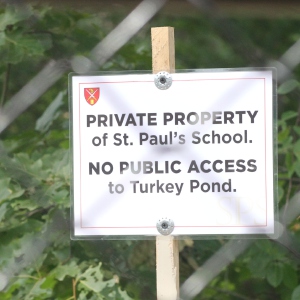
What’s the best way to get to New York City? We tested one of the new options for Concord-area residents.
It was opening weekend for the Concord-to-New York bus route and the group of Granite Staters who had congregated on a Manhattan side street were in high spirits.

Track & field: Coe-Brown boys, girls finish as D-II runner-up
KINGSTON – It was far from a normal track season this spring.
Most Read
 St. Paul’s School won’t reopen public access to Turkey Pond
St. Paul’s School won’t reopen public access to Turkey Pond
 U.S. Rep. Maggie Goodlander buys home in Concord, in NH’s second district
U.S. Rep. Maggie Goodlander buys home in Concord, in NH’s second district
 Shaun St. Onge, a former coach and administrator at Merrimack Valley High School, will serve as the school’s next principal
Shaun St. Onge, a former coach and administrator at Merrimack Valley High School, will serve as the school’s next principal
 Marshalls coming to Merchants Way at Exit 17
Marshalls coming to Merchants Way at Exit 17
 Database: Enrollment of each private school in New Hampshire since the Education Freedom Account program started
Database: Enrollment of each private school in New Hampshire since the Education Freedom Account program started
 ‘Our hearts never forget’: Marguerite Moffet wants recognition for the sacrifices of NH veterans
‘Our hearts never forget’: Marguerite Moffet wants recognition for the sacrifices of NH veterans
Editors Picks
 The Monitor’s guide to the New Hampshire legislature
The Monitor’s guide to the New Hampshire legislature
 One year after UNH protest, new police body camera footage casts doubt on assault charges against students
One year after UNH protest, new police body camera footage casts doubt on assault charges against students
 ‘It’s always there’: 50 years after Vietnam War’s end, a Concord veteran recalls his work to honor those who fought
‘It’s always there’: 50 years after Vietnam War’s end, a Concord veteran recalls his work to honor those who fought
 ‘We honor your death’ – Arranging services for those who die while homeless in Concord
‘We honor your death’ – Arranging services for those who die while homeless in Concord
Sports

Track & field: Distance runners lead Hopkinton to D-III title defense
KINGSTON – The Hawks knew that a title defense was possible, but it would take doubling, tripling, even quadrupling in events for them to get there. Hopkinton executed its plan to perfection.
 High schools: Final results from the regular season, tennis tourney action
High schools: Final results from the regular season, tennis tourney action
 Girls’ lacrosse: Coe-Brown secures playoff spot with 12-10 win over Pelham
Girls’ lacrosse: Coe-Brown secures playoff spot with 12-10 win over Pelham
 Baseball: Bow secures top-four seed with win over Kingswood
Baseball: Bow secures top-four seed with win over Kingswood
Opinion

Opinion: Our leaders’ puzzling decision to eliminate the State Council on the Arts
Sal Prizio is the executive director of the Capitol Center for the Arts.
 Opinion: How dark can it get?
Opinion: How dark can it get?
 Opinion: Unfair taxes, unfair schools: The New Hampshire way
Opinion: Unfair taxes, unfair schools: The New Hampshire way
 Opinion: In the fight to stop sexual violence, can polio hold the solutions?
Opinion: In the fight to stop sexual violence, can polio hold the solutions?
 Opinion: Where are the permanent solutions for a more stable budget?
Opinion: Where are the permanent solutions for a more stable budget?

Your Daily Puzzles

An approachable redesign to a classic. Explore our "hints."

A quick daily flip. Finally, someone cracked the code on digital jigsaw puzzles.

Chess but with chaos: Every day is a unique, wacky board.

Word search but as a strategy game. Clearing the board feels really good.

Align the letters in just the right way to spell a word. And then more words.
Politics

New Hampshire school phone ban could be among strictest in the country
When Gov. Kelly Ayotte called on the state legislature to pass a school phone ban in January, the pivotal question wasn’t whether the widely popular policy would pass but how far it would go.
 Sununu decides he won’t run for Senate despite praise from Trump
Sununu decides he won’t run for Senate despite praise from Trump
Arts & Life

A sneak peak of summer events in the Concord area
Getting excited for the summer and all it has to offer? Here’s a sneak preview of some of the most exciting events coming to the Concord area in the next few months!
 Pierce Manse reopens for the season
Pierce Manse reopens for the season
 Vintage Views: The Liars Club
Vintage Views: The Liars Club
 Two Villages Art Society begins summer members show
Two Villages Art Society begins summer members show
 Artist Spotlight: Brittany Batchelder
Artist Spotlight: Brittany Batchelder
Obituaries
 Edward A. Tasker
Edward A. Tasker
Barnstead, NH - Edward A. Tasker, 77, of Barnstead, with his loving family by his side, "left to go fishing," on Monday, May 26, 2025. Ed was born on June 1, 1947, in Midland, TX, but he always considered New Hampshire to be his home. ... remainder of obit for Edward A. Tasker
 Harley R. Hayes
Harley R. Hayes
Concord, NH - Harley R. Hayes, age 85, of Rumford Street, passed away peacefully on May 25th, 2025 at Granite VNA Hospice House. He was born in Plymouth, NH the son of the late Robert and Marjorie (Belanger) Hayes. He worked for many y... remainder of obit for Harley R. Hayes
 George E. Boucher
George E. Boucher
Nashua, NH - George E. Boucher, 92, a lifelong Nashua resident, passed away Monday evening, November 18, 2024 after a brief period of declining health. Born in Nashua on August 29, 1932, he was the son of the late George J. and Albe... remainder of obit for George E. Boucher
 Caryl L. Lajoie
Caryl L. Lajoie
Concord, NH - It is with great sadness that we announce the passing of Caryl Louise Lajoie (nee Burbank) on May 29, 2025. Caryl was born on September 14, 1938, in Derry, NH, the daughter of Ruth (Coe) Burbank and Francis A. Burbank 2nd.... remainder of obit for Caryl L. Lajoie


 White Mountain art exhibition makes new home at New Hampshire Historical Society
White Mountain art exhibition makes new home at New Hampshire Historical Society
 Merrimack Valley schools unlikely to fully absorb $2 million over-expenditure this school year
Merrimack Valley schools unlikely to fully absorb $2 million over-expenditure this school year
 Girls’ lacrosse: Bow wins first round game against Kearsarge, 18-3
Girls’ lacrosse: Bow wins first round game against Kearsarge, 18-3
 Boys’ tennis: Kearsarge and Bishop Brady win D-III semifinals, will face off in championship
Boys’ tennis: Kearsarge and Bishop Brady win D-III semifinals, will face off in championship
 ‘I don’t know how we’ll be able to keep up’ – Senate restores but pares down Office of the Child Advocate
‘I don’t know how we’ll be able to keep up’ – Senate restores but pares down Office of the Child Advocate
 Somersworth man arrested after high-speed chase through multiple towns in New Hampshire
Somersworth man arrested after high-speed chase through multiple towns in New Hampshire
 Debra Douglas steps down as chairman of New Hampshire Lottery Commission after 15 years
Debra Douglas steps down as chairman of New Hampshire Lottery Commission after 15 years

 Track & field: Goulas wins all 3 jumping events, Saysaw sets two records to lead Concord girls to first D-I title since 1988
Track & field: Goulas wins all 3 jumping events, Saysaw sets two records to lead Concord girls to first D-I title since 1988 Concord became a Housing Champion. Now, state lawmakers could eliminate the funding.
Concord became a Housing Champion. Now, state lawmakers could eliminate the funding. ‘A wild accusation’: House votes to nix Child Advocate after Rep. suggests legislative interference
‘A wild accusation’: House votes to nix Child Advocate after Rep. suggests legislative interference  Town elections offer preview of citizenship voting rules being considered nationwide
Town elections offer preview of citizenship voting rules being considered nationwide
